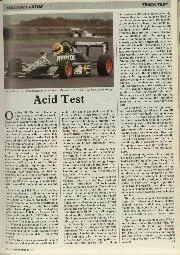
Vauxhall Lotus - Track Test
Acid Test October '88. The 'old' Silverstone Club circuit, a cold drying track, few cars and no spectators. A novice racer carefully exits the pit lane in a sleek and…
The Alfa Romeo Giulia TI Super might never have enjoyed the cachet — nor the on-track success — of later homologation specials built by the Italian manufacturer, but it was the first Alfa touring car fine-tuned for international motorsport by the in-house Autodelta competitions department. And that makes it the forebear of everything from the 1600 GTA through the GTV6 on to the high-tech 155 TI DTM and beyond.
The TI Super was one of the first projects undertaken by ex-Ferrari Formula 1 designer Carlo Chiti’s Autodelta organisation after it was incorporated into Alfa in 1963. It breathed on the four-box saloon Giulia TI to create the TI Super, a more powerful and lighter racing special aimed at what was then called the European Touring Car Challenge (generally known as the ETC).
The engine specification was borrowed from the existing Giulietta Sprint Speciale coupé. The 45 DCOE twin-choke Weber carburettors raised the power output from the standard TI’s shade more than 100bhp to something in the region of 130bhp. The TI Supers were rated at 127bhp, but race versions of the time had closer to 140 horses.
The better part of 100 kilos were taken out. There were lighter door panels, a new front grille with two fewer headlights, revised bumpers, plexiglass rear windows (and no front-quarter lights) and magnesium alloy wheels that had been first seen on the Giulia TZ coupé. That all contributed to the 910kg homologation minimum.
There were changes inside, too. The column-mounted gearshift that allowed the Giulia saloon to be marketed as a six-seater with a bench at the front made way for a conventional floor-mounted stick between racing-style bucket seats. The usual interior fixtures and fittings — including the ashtray — all disappeared for weight reduction.
The car was launched at Monza in April 1963, but the 500 examples required for the ETC’s Group 2 rules (total production of TI Supers hit 501) weren’t completed until the following May. That allowed the car to compete in the ETC. A TI Super entered under the Jolly Club banner with future Formula 1 racer Andrea de Adamich on the driving roster claimed a third in class at the Brands Hatch 6 Hours in June, a precursor to a one-two-three result at Monza at the end of the year. Grand prix winner Giancarlo Baghetti claimed outright victory aboard a Jolly Club-entered car in the 650km race.
Back at Monza for the ’65 series opener, the TI Super dominated the four-hour race for cars entered in divisions 2 and 3 (the multi-class ETC mixed and matched its various categories in its early years). De Adamich and Sandro Arcioni took the laurels, with other Giulias in second, third and sixth.
That would be the final victory for the TI Super in the ETC, and there was an obvious explanation – the Lotus Cortina, Ford’s own touring car special. Alan Mann Racing dominated the up-to-1600cc class with the Cortina over the remainder of the season on the way to the division 2 title with Sir John Whitmore driving.
Alfa couldn’t beat the Lotus Cortina with the Giulia, but it could with the next tin-top to emerge from Autodelta’s workshops, now relocated to Milan. The race version of the 1600 GT, the lightweight GTA, put the marque back on top. De Adamich won the 1600 class in the ETC with the aluminium-panelled car in each of the next two seasons.
The Giulia TI Super wasn’t exactly a trailblazer, but it was a signal of intent from Alfa Romeo of its touring car aspirations.
Price new 2.4m lira (£1400est)
Price now £20-30,000 (recreation), £60-70,000 (original)
Engine 1600cc, in-line four
Power 130-155bhp
Rivals Ford Lotus Cortina, Lancia Flavia Sport Zagato
Verdict A poor man’s Lotus Cortina
Niche classic remains difficult to value
As interest in historic motor sport continues to grow, so too does the market interest in vehicles that allow owners to compete in its ranks. The Alfa Romeo Giulia TI Super was one of the original four-door sports saloons, and despite 501 examples being produced, it has been estimated that only around 50 now survive.
With so few examples still on the road it is no surprise that there are limited opportunities to assess values from publicly available data. In December 2014, a 1963 Giulia TI Super was listed for sale at £34,500 and was followed by a 1964 car at €55,000 (£40,000 at the time) in 2016.
Running alongside these have been a few auction entries: chassis number 595469 sold in December 2016 for £40,250. Another car, chassis 595241, failed to sell with a guide of £80,000 – £120,000 in May 2017.
The TI Super is a popular vehicle with a passionate following, but is somewhat of a niche vehicle. Perhaps a greater sale price could have been achieved for the December 2015 seller via specialist dealers, it was a good buy and we could see values increasing to nearer the £60,000 soon.
Target deal
Giulia TI Super – £40,000 – £60,000
Robert Johnson, Classic and Sports Finance
